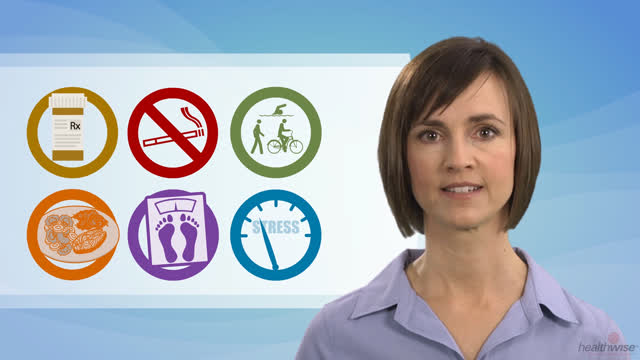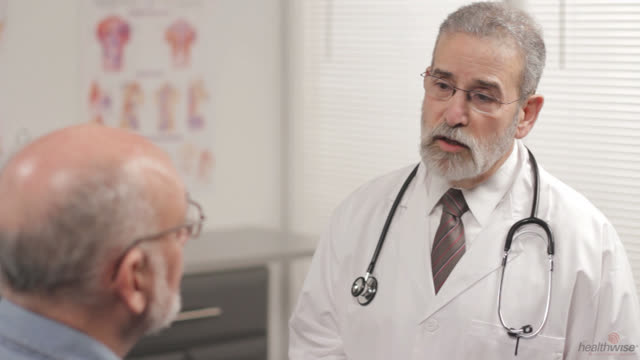Coronary Artery Disease: Roles of Different Doctors
Overview

What health professionals are involved in taking care of people who have coronary artery disease?
After a diagnosis of coronary artery disease (CAD), you should visit your primary care physician every few months. Your doctor can help track your condition and make sure that your treatment is going as planned. If you have complications or need special procedures (such as cardiac catheterization or open-heart surgery), you may need treatment from a range of specialists.
Understanding your health professionals' roles
Depending on how severe your CAD is and whether you already have complications, you may need a team of health professionals to help treat your disease and manage your treatment plan.
This table outlines the types of health professionals who may be involved in the treatment of CAD and its complications.
|
Health professional |
Who are they? |
What is their role? |
When would you see them? |
|---|---|---|---|
|
Primary care physician |
Internist, family physician |
They manage your medical care. |
Regular visits (about 2 to 4 per year) |
|
Cardiologist |
Heart specialist |
This doctor provides specialty medical care. |
Sometimes for regular visits or when CAD gets worse |
|
Other physicians |
Nephrologist (kidney specialist), cardiovascular surgeon (heart surgeon), neurologist (brain/nerve specialist) |
They provide specialty medical care for complications of CAD. |
When complications arise or when special procedures need to be done |
|
Nurse educator |
Specific type of nurse |
This nurse can educate you and help you take control. |
Whenever medicines, diet, or self-management needs to be explained |
|
Cardiac rehabilitation team |
Doctor, nurse specialist, dietitian, exercise therapist, and physical therapist |
Your team will help you recover from an event or procedure and make healthy lifestyle changes. |
During the rehab program |
|
Psychiatrist, psychologist, or social worker |
Mental health professional |
They help you cope with psychological aspects of disease. |
Regularly (perhaps weekly), for as long as you need |
|
Registered dietitian |
Nutritional expert |
He or she can help you with heart-healthy diet. |
Initially, and whenever diet needs to be changed |
Although you may not need help from all of these providers, it is good to be aware of them. You may encounter them at some point during the course of your treatment. If you need the help of other health professionals, you should keep in close contact with your primary care doctor. Make sure to report any changes in the way you feel or any medicine-related side effects. Each person's experience with CAD and with its complications is different. Your health professionals will help tailor your treatment to best suit your needs.
What is the role of a primary care physician in caring for people who have coronary artery disease?
In some cases, your primary care physician (PCP)—usually an internist or family medicine physician—will coordinate your care. He or she may be responsible for the day-to-day medical management of your coronary artery disease. In these cases, your PCP will be the one who evaluates your risk factors, does tests, and looks for signs of other diseases.
After you are diagnosed with CAD, your PCP will help you build a treatment plan. He or she will also decide if you need to start taking medicines or if you need certain procedures to diagnose how severe your CAD is. For this reason, it is important that you are open with your doctor. Make sure that he or she knows of any changes in your symptoms.
In general, you should visit your PCP once every few months. This is a good chance to make sure that you are on track with your CAD treatment and to continue with your general medical care. Along with a physical exam at each visit, you and your doctor should review how you're doing with lifestyle changes and with your prescribed medicines. If you have new or changing symptoms, your PCP may do or request tests to check your heart.
Most primary care physicians are qualified to develop and manage treatment plans for chronic diseases such as CAD. But if you develop complications or have more severe CAD that needs a procedure or surgery as treatment, your primary care physician may refer you to a specialist.
What are the roles of specialists in caring for people who have coronary artery disease?
In some cases, a cardiologist will be your main point of contact in treating and managing your CAD. Whether you work more closely with a primary care physician (PCP) or a cardiologist depends on many things, including the nature of your condition and the relationship you may already have with either doctor. Whether you see your cardiologist to treat mild atherosclerosis or to provide follow-up care after a major surgery, this specialist will add heart-specific expertise to your treatment plan.
What is the role of an interventional cardiologist?
An interventional cardiologist can do a cardiac catheterization. This is an invasive procedure used to take X-rays of your arteries and diagnose any narrowed areas in your coronary arteries. An interventional cardiologist can also do an angioplasty and place stents during a cardiac catheterization to open narrowed or blocked arteries.
What is the role of a cardiac surgeon?
In some people, an open-chest surgery, called bypass surgery, may be recommended to bypass a narrowed or blocked vessel and allow blood to reach the heart.
A cardiothoracic surgeon is a specialist trained to do this surgery. This type of surgeon may also be called a cardiovascular surgeon or a cardiac surgeon.
What are the roles of other specialists?
If you develop certain CAD-related complications, you may need to see a number of other specialists. For example, you may need to see a nephrologist (kidney specialist) if you develop kidney problems. You may need to see a neurologist (brain and nervous system specialist) if CAD leads to a stroke. Your primary care physician will direct you to the specialists who are skilled in treating your specific condition. You may be referred to the following specialists.
Nurse educator
While primary care physicians serve as central coordinators of care for many people with CAD, nurse educators are valuable resources as well.
Along with serving as a care coordinator, your nurse educator will serve other important functions. For example, he or she may be the first one to help you understand CAD and start your treatment plan. He or she may teach you about the effects of various medicines on your condition and help you with lifestyle changes.
One of the nurse educator's most important roles is to provide you with the information you need about your disease as you are ready to handle it. You will have CAD for the rest of your life. Your nurse educator can be there with the information that you need to adapt to changes in your condition.
Cardiac rehabilitation team
A cardiac rehabilitation (rehab) program teaches you how to be more active and make lifestyle changes that can lead to a stronger heart and better health. This team often includes a doctor, a nurse specialist, a dietitian, an exercise therapist, and a physical therapist. The team designs a program just for you, based on your health and goals. Then they give you support to help you succeed.
Dietitian
What you eat has a big effect on your coronary artery disease. You may seek the aid of a registered dietitian to help you plan a heart-healthy diet. If you also have high blood pressure (hypertension) or diabetes, it may be important to limit salt and sugar intake as well.
Registered dietitians are trained in nutrition. They are experienced in helping people make lifestyle changes. They understand that adjustments to your eating habits can be the hardest changes to make. And they can help you take small steps toward the larger goal of a balanced diet.
Mental health professional
Many people with serious conditions such as CAD have depression. Psychiatrists, psychologists, and clinical social workers can help you deal with the mental challenges that come with any CAD-related complications that you may have. Also, they can help you learn to manage the stress in your life. This can affect the success of your treatment plan.
Related Information
Credits
Current as of: June 24, 2023
Author: Healthwise Staff
Clinical Review Board
All Healthwise education is reviewed by a team that includes physicians, nurses, advanced practitioners, registered dieticians, and other healthcare professionals.
Current as of: June 24, 2023
Author: Healthwise Staff
Clinical Review Board
All Healthwise education is reviewed by a team that includes physicians, nurses, advanced practitioners, registered dieticians, and other healthcare professionals.





